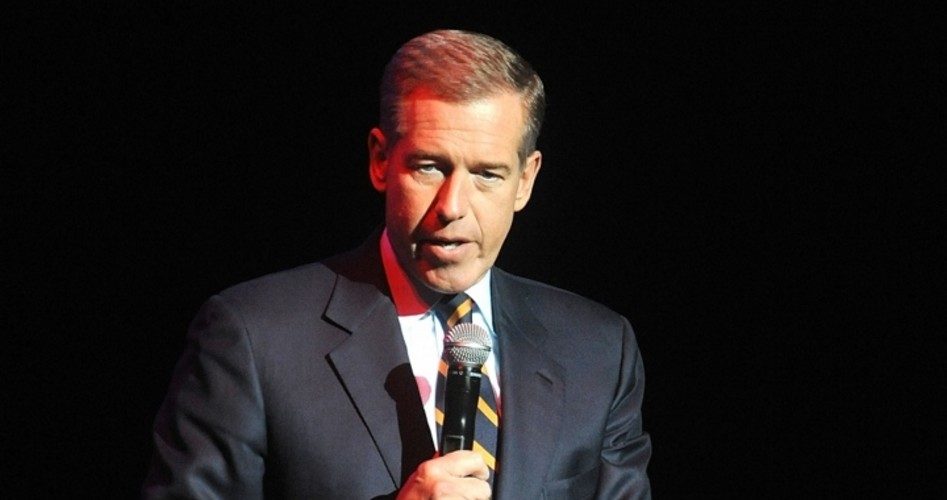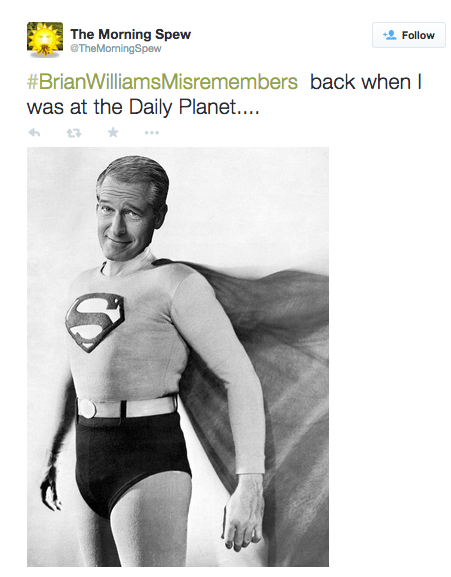
NBC newsman Brian Williams (shown) said that while covering the Iraq War in 2003, he’d come under fire. Now many are calling for him to be fired.
Because his story, which he has repeated more than once, is false.
Writes the Washington Post:
Williams said he was not aboard a helicopter that was hit by enemy fire and forced down — a story he retold as recently as last week during a televised tribute to a retired soldier during a New York Rangers hockey game.
On “NBC Nightly News” Wednesday evening, Williams read a 50-second statement apologizing for his characterization of the episode.
“After a groundfire incident in the desert during the Iraq war invasion, I made a mistake in recalling the events of 12 years ago,” he said. “It did not take long to hear from some brave men and women in the air crews who were also in that desert. I want to apologize. I said I was traveling in an aircraft that was hit by [rocket-propelled grenade] fire. I was instead in a following aircraft…. This was a bungled attempt by me to thank one special veteran and, by extension, our brave military men and women, veterans everywhere, those who have served while I did not.”
Williams emphasized his claim that his story was a mere error, saying in his statement, “I would not have chosen to make this mistake.” Yet many believe this strains credulity, especially since his aircraft was “following” perhaps 100 miles behind those that took the fire, according to Stars and Stripes, which broke the story. Providing further detail, the newspaper explained that Williams’ “admission came after crew members on the 159th Aviation Regiment’s Chinook that was hit by two rockets and small arms fire told Stars and Stripes that the NBC anchor was nowhere near that aircraft or two other Chinooks flying in the formation that took fire. Williams arrived in the area about an hour later on another helicopter after the other three had made an emergency landing, the crew members said.”
In fact, Williams’ story was so distant from reality that many say there’s only one way to characterize it: as a self-serving lie. Worse still, says Truth Revolt’s Larry O’Connor, he lied about the lie. In a piece entitled “Brian Williams Misleads Viewers in His Apology for Misleading Viewers,” he provides more information on the “following” claim, telling us “Military reporter Steve Liewer, who worked for Stars and Stripes at the time [2003] and reported on the incident, writes that crew members Lance Reynolds and pilot Chris Simeone ‘said they don’t remember seeing Williams again’ after his crew took photographs of the wounded chopper.”
And as Liewer also reported, “‘That’s why I was in shock that he made that claim,’ said Don Helus, the pilot who maneuvered the wounded Chinook to a safe landing in the desert after a rocket-propelled grenade damaged it. ‘They had no damage, and they didn’t take fire.… My crew was a little upset about that — somebody trying to make a claim to inflate their career,’ Helus said.”
And in this inflation the newsman had laid it on pretty thick. Just consider his relation of the Iraq story on David Letterman’s show in 2013. After telling the host, “I do go cover these two wars we’ve been fighting, and when I do, I like to go out on patrol, I like to get out in it,” Williams gave his mythical version of events. The New York Post relates the exchange:
“We were in some helicopters. What we didn’t know was we were north of the invasion. We were the northernmost Americans in Iraq. We were going to drop some bridge portions across the Euphrates so the 3rd Infantry could cross on them. Two of our four helicopters were hit by ground fire, including the one I was in. RPG and AK-47.”
When Letterman asked what happened when they realized they’d been hit, [Williams replied] “We figured out how to land safely, we landed very quickly and hard and we put down and we were stuck — four birds in the middle of the desert — and we were north out ahead of the other Americans.”
Williams continued, “We got hit, we set down, everyone was OK, our captain took a Purple Heart injury to his ear in the cockpit, but we were alone, they started distributing weapons, we heard a noise and it was Bradley fighting vehicles and Abrams tanks coming, they happened to spot us.
Letterman would say to Williams shortly afterwards, “I have to treat you with renewed respect, [sic] that is an incredible story.… You are a true journalist and a war hero,” reported the Post.
And while it does appear that engendering respect was Williams’ goal, he’s now receiving anything but. The Washington Post provides a sampling of mocking Twitter users:
• Paul Szoldra@PaulSzoldra writes, “This Brian Williams RPG story reminds me of the one time I was wounded in the Battle of Stalingrad.”
• Tommy@FirstTeamTommy says, “Hey folks, let’s leave @BWilliams alone. I, too, have trouble remember details of places I’ve served. Like Gettysburg…”
• Daniel Wright @DanSWright tweeted, “Brian Williams has announced that, despite his recollections, he was not on the Titanic. He saw the film and was confused.”
Then there’s this one, tweeted by The Morning Spew and reprinted by the Post:

But Williams isn’t the first leftist to try to steal the spotlight by playing a person of steel — there’s also Superwoman, a.k.a. Hillary Clinton. In 2008, the then-presidential candidate had to admit that she also peddled a false battle story. As Reuters reported on March 24 of that year:
In a speech in Washington and in several interviews last week Clinton described how she and her daughter, Chelsea, ran for cover under hostile fire shortly after her plane landed in Tuzla, Bosnia.
Several news outlets disputed the claim and a video of the trip, showed Clinton walking from the plane, accompanied by her daughter. They were greeted by a young girl in a small ceremony on the tarmac and there was no sign of tension or any danger.
Like Williams, Clinton also dismissed the gravity of her falsehood, saying, “So I made a mistake. That happens. It proves I’m human, which, you know, for some people, is a revelation.”
“A mistake” — “it happens.” But what’s happening more and more frequently, say critics, is a failure to take responsibility. As American Thinker’s J.R. Dunn writes, analyzing Williams’ “I would not have chosen to make this mistake” line:
What Williams is doing here, of course, is employing the passive voice to distance himself from the action. Instead of possessing actual agency and taking some measure of responsibility for the situation he’s involved in, Williams is claiming to be merely an onlooker, a Cartesian point-of-view consciousness looking on helplessly while events unfold around him. This style of usage is quite commonplace among the postmodern, particularly as involves criminals and hustlers, as in the classic case of the lowlife murderer recounted by Theodore Dalrymple: “…then the knife went in.”
But whether Williams will get the axe is questionable. Clinton suffered no career disruption, and Williams shares that commonality with her of being a leftist. While the notoriously liberal media will go so far as to peddle damaging false stories about those they deem conservatives — as newsman Dan Rather did about President George W. Bush in 2004 — they defend their own. And what is a falsehood to them but a “truth” from a different perspective, anyway? As was related to me about what happened when a West Virginia prosecutor questioned a reporter’s “error” in a story, the journalist’s response was (I’m paraphrasing), “It’s okay if we lie — because we’re on the right side.”
Photo of Brian Williams: AP Images


